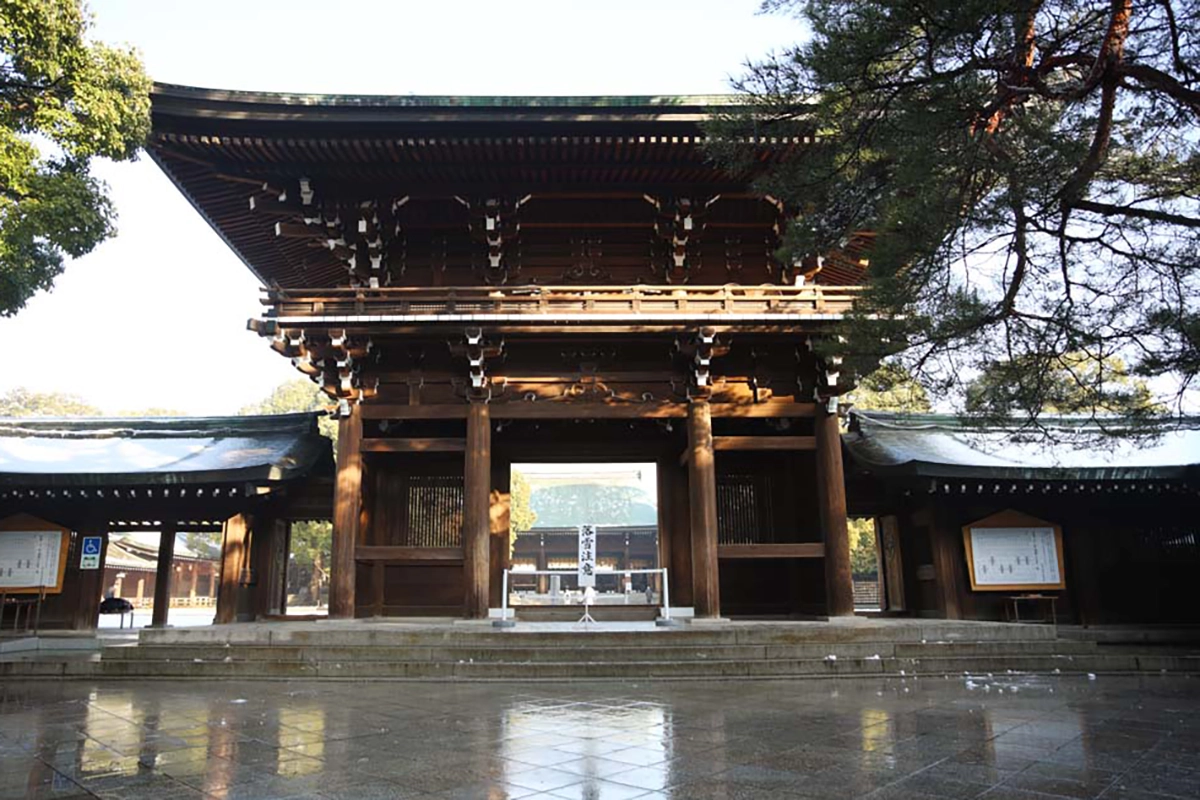Tokyo’s Tranquil Oasis of Tradition and Culture: Meiji Jingu
In the bustling heart of Tokyo’s Shibuya district, amidst the sea of towering skyscrapers and the constant ebb and flow of city life, there exists a sanctuary of tranquility and tradition – Meiji Jingu. This renowned Shinto shrine, constructed in 1920, stands as a testament to the enduring legacy of Emperor Meiji and Empress Shoken, pivotal figures in Japan’s history who ushered the nation into the modern age. It’s a place where the past seamlessly interlaces with the present, offering visitors an opportunity to delve into Japan’s rich cultural heritage.
Meiji Jingu’s architectural grandeur and expansive grounds captivate both tourists and locals. The shrine’s structures, intricately designed and impeccably maintained, house an array of historical artifacts. Among them, you can find the elegant carriage of the Emperor and the Empress’s cherished kimono, providing an intimate glimpse into their lives. As you wander through this sacred space, you’ll be enveloped by a serene atmosphere, creating a haven for reflection and reverence.
One of Meiji Jingu’s crowning jewels is its dense forested surroundings, a sharp contrast to the urban bustle just beyond its gates. The towering evergreen trees and the melodic chirping of birds offer visitors a respite from the urban clamor, allowing them to embrace the harmony of nature. It’s here, among the whispering leaves and rustling branches, that you can truly appreciate the shrine’s role as a cultural anchor.
Throughout the year, Meiji Jingu plays host to a vibrant tapestry of seasonal festivals, each a colorful thread in the rich fabric of Japanese tradition. The Hatsumode festival, held every January 1st, is a magnificent spectacle drawing people from all corners of the globe. It’s a time when visitors can partake in traditional Japanese rituals, paying homage to the Emperor and Empress, and perhaps making their wishes known to the divine. The atmosphere is electric, with food stalls, performances, and the joyful chatter of attendees. It’s an experience that immerses you in Japan’s customs and heritage.
But it’s not just the Hatsumode festival that makes Meiji Jingu an unmissable destination. Throughout the year, the shrine comes alive with a series of other festivals, each offering unique insights into the culture and traditions of Japan. Whether it’s the vibrant Spring Grand Festival or the solemn Yabusame Archery ritual, there’s always something happening at Meiji Jingu to capture your imagination.
What makes Meiji Jingu even more enticing is its strategic location in the heart of Tokyo. It’s a stone’s throw away from other popular attractions like Harajuku, known for its quirky street fashion and vibrant youth culture. Yoyogi Park, a sprawling green oasis, offers a chance to picnic, people-watch, or simply bask in the beauty of cherry blossoms during the spring. And of course, the iconic Shibuya Crossing, where thousands of pedestrians converge in a mesmerizing ballet of movement, is just a short walk away.
However, a word of caution for those who wish to visit this cultural gem – Meiji Jingu, while offering a serene escape, can get quite busy during peak travel seasons. To make the most of your visit and avoid the crowds, it’s best to arrive early and savor the peaceful ambiance that envelops the shrine before the rush of tourists sets in.
In conclusion, Meiji Jingu stands as a testament to the enduring spirit of tradition and culture in the heart of Tokyo. Its architectural beauty, serene surroundings, and rich history make it a destination that should not be overlooked. The shrine’s numerous seasonal festivals serve as windows into Japanese customs and traditions, offering visitors a profound connection to the nation’s heritage. A visit to Meiji Jingu is an unforgettable journey into the heart of Japan, a place where past and present converge in a harmonious dance of culture and history.
